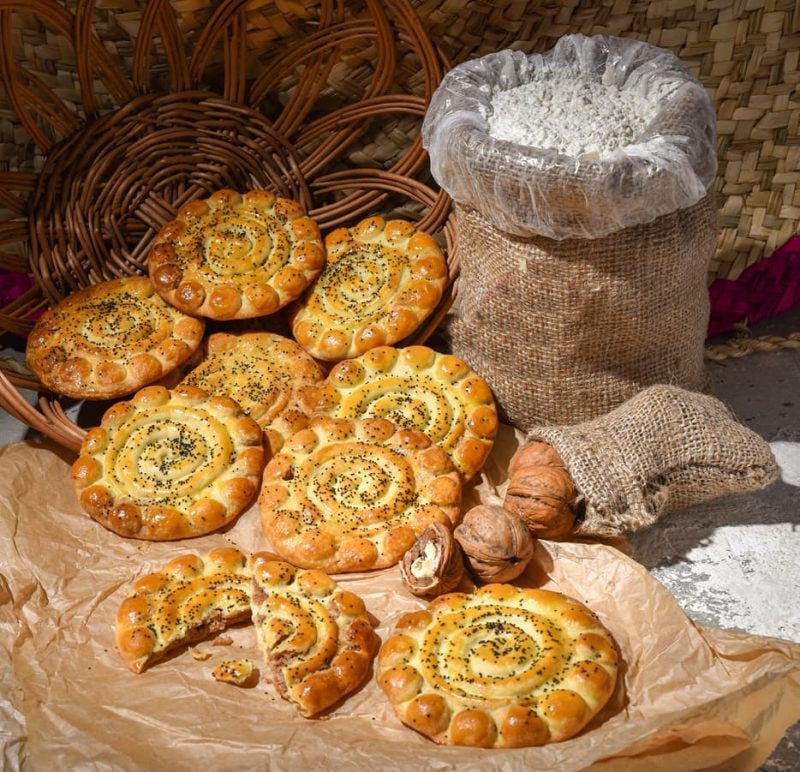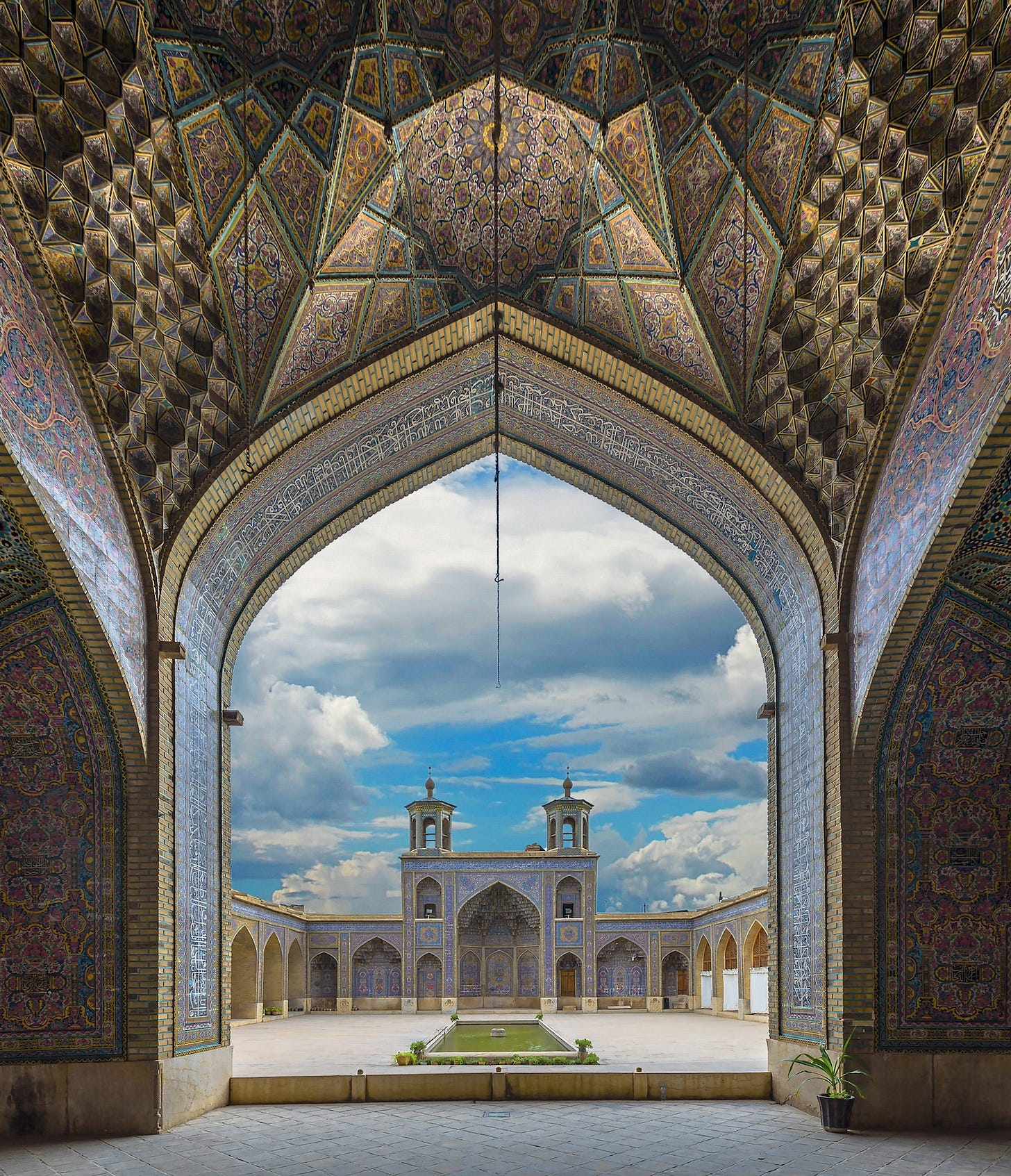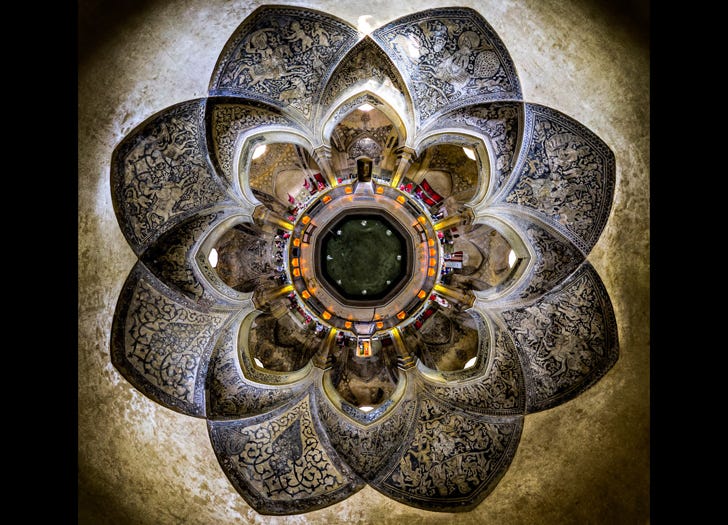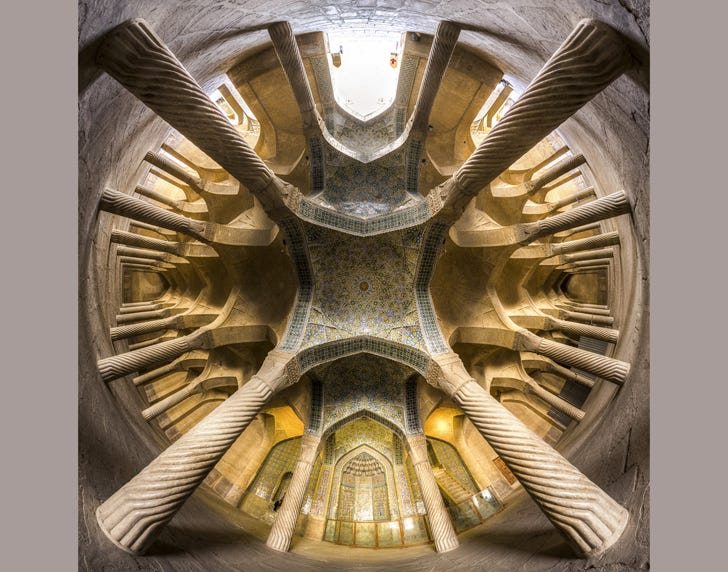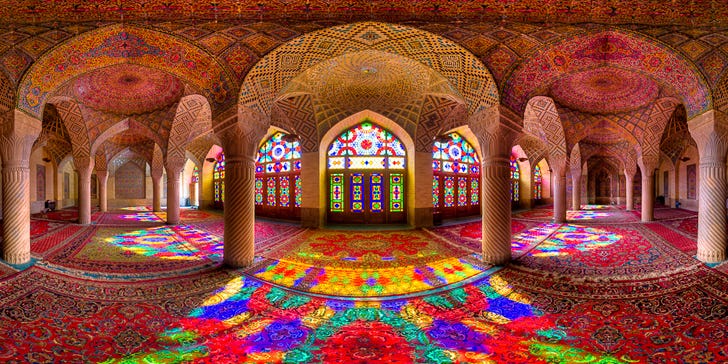The replicant, the Mole & the Impostor, Part 27
Part 2—the conclusion—of a duology where a reality event held in a refugee camp on a Greek island unfolds in an utterly unexpected manner. There will be 50 parts. Chapter 8: April.

🌚🌞🌝
Next, Katja and Olga go to Abeer and Ablam, the two friends who are expanding their Peaceable Autonomy app—true believers, only—into an Iran/Iraq friendship moodscape, in the spare moments that their skills are not direly needed. As it is, Katja and Olga are surprised to find them at their neo-homestead, expecting them to be working somewhere in the camp.
“So good to see you,” Katja says. “How are you?”
“We’re happy,” Ablam says, “really happy.”
“Our new mosque will open Monday,” Abeer says. “Right at the start of Ramadan.”
“Ramadan last year in the camp was horrible,” Ablam says. “Some of us almost starved. As you noticed when you arrived last August, circumstances were dire.”
“But now we are prepared,” Abeer says. “For one, we stocked food.”
“And we have shelter,” Ablam says, “so we can rest unperturbed during the day, if needed.”
“So can we offer you tea?” Abeer says. “We only see you at daytime—as you are not allowed to enter our camp at night—so this is the last time we can offer you for this month.”
“Thank you,” Katja says, “but we already had tea with Hind.”
“One little cup more won’t hurt,” Ablam says, “and we have koloocheh.”
“Is that the cookie with the cinnamon and the crushed walnuts?” Katja says. “I love it.”
“Then please come in.”
“Wow,” Olga says as she sees the koloocheh, “we can skip lunch now.”
“If I see this,” Katja says, “lunch is overrated.”
Knowing that they’ve already had tea, Abeer gets out the small cups they normally use for coffee, and serves them with tea. In the meantime, Ablam cuts thick slices of the Persian cake.
“Weren’t you involved with the electric wiring of the mosque?” Olga asks after swallowing a mouthful of the rich cake.
“In the beginning we were,” Abeer says, “but then the men asked if we could show them how, so they could finish it.”
“They wouldn’t let you do it?” Katja says, her tone both chagrined and vexed.
“Well, some men are very protective of their mosque,” Ablam says. “It’s in their nature.”
“So much they wouldn’t let you do it?” Olga says. “Even while you are more skilled?”
“Be that as it may,” Abeer says, “it’s not worth the fight.”
“And all of them are regulars in our Peaceable Autonomy app,” Ablam says, “not knowing we—two women—set it up, as we keep that a well-guarded secret—and you should, too. We like the irony.”
“But then you’ll never get proper credit for your work,” Katja says. “That’s not right.”
“Getting credit is not important,” Abeer says, “as Allah knows. Getting the work done is what really counts.”
“But in this way men will always treat you, well, differently,” Olga says, trying to be tactful.
“There are other ways that we remind men that they need us,” Ablam says. “And there is an increasing number of men—a silent minority that’s growing—who know it but all too well and thank us in private.”
“Change is happening,” Abeer says. “Although probably not as fast as you westerners want. But I can assure you we are not a static people.”
“We try to respect your culture and beliefs,” Olga says, “while we also want to support you.”
“We’re fine, thank you,” Abeer says. “We have our ways.”
“That’s good,” Katja says. “Mind if I ask something personal?”
“Of course not,” Ablam says. “What is it?”
“Have you seen Riham Saad?” Katja asks. “I haven’t seen her for days.”
Abeer and Ablam look at each other, then shake their heads. “No, I don’t recall seeing her, either,” Abeer says.
“Didn’t she go to live with a family in the EU?” Ablam says. “At least, that’s what I heard.”
“That’s true,” Katja says, “but she hasn’t said goodbye to us. I thought—hoped—she might still be somewhere in the camp.”
“Sorry to hear that,” Abeer says, “but we really haven’t seen her.”
“She’ll be alright,” Ablam says. “She’s a tough cookie.”
“Yes, she is,” Katja says, “but I miss her.”
“Nothing they can do about it,” Olga says. “Let’s go. Many thanks for the tea.”
“And the Koloocheh is the best,” Katja says. “Can we wish you a good Ramadan?”
“Yes you can,” Abeer says as Ablam nods with vigor, “just say Ramadan Kareem.”
“Ramadan Kareem,” Katja and Olga say, “and see you.”
“Take care,” the two Islamic ladies say.
🌝🌚🌞
Rahman, Kristel, and Akama walk around in the Middle Eastern section of the camp, checking if their help is needed with, well, anything. They find that almost all the activity is focused on the new mosque. Even if it’s finished on the outside, there is still plenty of work to be done on the inside, judging from the amount of people going in and out with tools, equipment, and material.
This is where the trio holds back. While they have been assisting with building the outer layers of the mosque and its minaret —the foundation, walls, and roof—they know that the Islamic refugees want to do all the inner work by themselves. Yet they are also very curious as to how that is progressing. They watch for a few minutes and are about to walk away when Ayman al-Hazari walks out.
“Hello, my friends,” Ayman says. “Admiring our new mosque?”
“Yes, we are,” Akama says, “and to be honest, we’d like to see how things are proceeding on the inside.”
“So,” Rahman says, “do you take visitors?”
“Yes, we’re open to visitors,” Ayman al-Hazari says. “Only not during prayers and special events—unless you are specifically invited, like Murtaza Rahmani’s funeral.” He looks the three of them over.
“Well, we’re lucky that it is a chilly April day, so all of you are covered up,” Ayman says, “as proper and modest dress is required. You’re good, except the lady. Kristel, can you cover your hair with your scarf? Then you’re good to enter, too.”
“Well, seeing how busy everybody still is,” Akama says, “we can come back tomorrow.”
“No, today’s fine,” Ayman says, “as Ramadan starts tomorrow. Better to come today, or after Ramadan.”
“Alright, I guess we’ll go,” Akama says. “Do we?”
Rahman and Kristel nod.
“A few more things,” Ayman says. “Please remove your shoes, and enter with your right foot first. Then remember to exit with your left foot first.”
“Can do,” Rahman says.
“And no food or drinks inside our mosque,” Ayman says, “and please turn off your smartphones. Also, try to be a bit quiet: no loud noises or unnecessary conversation.”
“Will do,” Akama says. “Italians talks too much, as it is.”
“And our drones,” Rahman says, “are they allowed to go in?”
“Good question,” Ayman al-Hazari says. “There is no precedent for that. But since they are a part of you (until the reality event ends), and you’ve helped us so much, I think it’s alright. On top of that, it will show the world what we have achieved, and pictures of mosques—and their interiors—are not forbidden.”
“It’s out of our hands,” Rahman says, “but I promise we will be respectful.”
“Alright then,” Ayman says, “let’s go in. Remember, right foot first.”
“But,” Akama says, so distracted by the beauty of the whole mosque that he only notices it now, “this is a novo-portal.”
“The biggest one made, so far,” Ayman says, pride in his voice, “which will provide pre-cleansing, a prelude to ablutions, if you will. We’re not afraid to use new technologies.”
It’s one with a double membrane, and as they pass through it one by one, all of them are happily surprised by the slight minty taste of the disinfecting agents.
“That’s much better,” Kristel says. “The prototype smelled like an operating theatre.”
“This is one of the first where we can add odor and taste,” Ayman al-Hazari says. “Do you like the mint?”
“Yes,” Akama says, “most definitely an improvement.”
Once inside, they enter a walled plaza with a half-open roof and a fountain in the middle. On all sides, there are stools with washbasins and water taps.
“This is the ablutions area,” Ayman whispers, “where we Muslims perform our ritual cleansing—called Wudu—before we can go into the prayer hall.”
While this particular ablutions area looks both spartan and modern—black-and-white tiled floor, bare white ceilings that ingeniously hide their lighting sources—the sand-colored walls are adorned with arabesques of tendrils, palmettes, and half-palmettes.
“Is it okay to touch the wall?” Akama whispers.
“That’s fine, as long as you don’t disturb the people performing their ablutions,” Ayman says.
Akama wants to experience the stone relief, but to his utter surprise the wall is perfectly flat.
“What?” his shrill whisper is easily audible across the room.
“The outer layer of these metamaterial walls is basically a screen,” Ayman whispers, “the relief you see is faux, and ephemeral.”
As if to demonstrate the latter, now the three visitors notice that the arabesques are slowly changing: the tendrils become more tree-branch-like with leaves as their ochre background gradually fades to a lapis-lazuli-esque blue, and white calligraphy is superimposed on it.
“Wow,” Kristel whispers in awe. “M.C. Escher has nothing on this.”
“Our arabesques predate Mr. Escher by many centuries,” Ayman whispers. “Although I think it’s fair to say that both share a main inspiration source: mathematics.”
“Didn’t Escher actually visit the Alhambra and Mezquita of Cordoba?” Rahman whispers, remembering some old history lessons. “Which were constructed when the Moors conquered Spain?”
“The Umayyad Caliphate, to be more precise,” Ayman whispers, “which, back in AD 750, stretched from what is now Pakistan and Afghanistan in the East all the way to Morocco and Spain in the West, encompassing Iran, Iraq, Syria, Lebanon, Israel, Jordan, Tunisia, Saudi-Arabia, Oman, Yemen—my home country—and large parts of Turkey, Egypt, Libya and Algeria.”
“Didn’t it also coincide with the Golden Age of Islam?” Rahman tries to recall his old history lessons.
“That actually happened after the Umayyad Caliphate was overthrown by rebels led by the Abbasids,” Ayman whispers, “and the survivors of the Umayyad dynasty established themselves in Cordoba.”
“How come you know so much about Islam?” Akama whispers. “Aren’t you from a Hindustan country?”
“Bangladesh is indeed part of what the British called Hindustan,” Rahman whispers, “but—unlike India—ever since the establishment of the Bengal Sultanate we have been a predominantly Muslim country.”
“Alright,” Akama whispers, “I didn’t know. My apologies.”
“No problem,” Rahman whispers. “Never too old to learn, right?”
“True,” Akama whispers. He looks up and through the open roof. “This place is both smart and beautiful, but won’t it be a bit cold in winter?”
“The roof can be closed,” Ayman whispers, “but since we have quite nice weather today, it is open.”
“Do you have to wash the full body,” Kristel whispers, “or only parts of it?”
“To perform Wudu, you must make Niyyah—centering yourself—then wash your hands: use your left hand to wash your right hand three times, then use your right hand to wash your left hand, also three times,” Ayman whispers. “Next, wash your mouth three times, then wash your nose—the inside through inhaling water—three times. Then wash your face three times, followed by your lower arms from wrist to elbows, also three times. Clean your head and your ears—both outside and inside—only once. Finally, wash both feet—starting with your right foot—three times. And everything in exactly that order.”
“Alright,” Kristel says. “And then?”
“Then you are ready for prayer in the Prayer Hall,” Ayman whispers as he points the way. “Follow me.”
“Welcome to our Musallah,” Ayman whispers as they enter the Prayer Hall, “where we get on our knees to pray.”
The Prayer Hall is quite big, larger than it looks from the outside, although the semi-origami curves of its dome may be a trompe l’oeuil to disguise its real size. In contrast to the more spartan atmosphere of the ablutions area, the Musallah is well decorated, featuring an explosion of colors, arabesques, carved pillars surrounded by Persian carpets, and stained-glass windows. The multihued motifs are everywhere: in the carpets, on the walls and windowpanes, on the curved and carved ceilings emanating from the embossed pillars.
“Too much,” Akama whispers, “to take in at once.”
“This is incredible,” Rahman whispers. “And to think that all Muslims enter this hall of wonders to close their eyes—no offence meant,” he adds quickly.
“None taken,” Ayman says, “and we can look at everything after our prayers because this place is also meant to celebrate the beauty of God.”
“It most certainly does,” Akama whispers. “Okay to touch a pillar?”
“Go ahead,” Ayman says, “but don’t disturb those that are praying.” Akama carefully reaches out to touch a pillar to find that—this time—the relief is real. But it’s not static either.
“Please tell me I’m not going insane,” Akama whispers, “but are these pillars moving?”
“The pillars are like slow sculptures,” Ayman whispers, “morphological metamaterials that change shape gradually, in concert with the slow-yet-continuous changes we program into the walls, ceiling, and windows.”
“Not in the carpets?” Rahman whispers.
“No, these are old-fashioned Persians,” Ayman whispers.
“And the motif changes,” Akama whispers. “Are they at random?”
“No, they vary between those of existing mosques around the world,” Ayman whispers. “It was difficult enough to get the more conservative people to accept the implementation of changeable arabesques and motifs, per se. During Ramadan they only want one change per day, so I’m happy to show you what we really can do in our modern mosque right now.”
“Not to be that guy,” Akama whispers, even softer, “but you can certainly go even farther?”
“One of our programmers mixed the arabesques of old with Mandelbrot’s fractals,” Ayman whispers with a wink, barely audible. “It made the visions I once saw when smoking the wrong water pipe seem like a tempest in a teacup. Trippy.”
While carefully keeping their distance from the people praying—not that there are that many right now, but that will change tomorrow as Ramadan begins—Akama, Ayman al-Hazari, Kristel, and Rahman walk around the Prayer Hall, trying to take in the constantly changing sensory overload.
“But what about that semi-circular niche in the wall over there?” Akama whispers. “It sticks out because—as far as I can see—it doesn’t change.”
“That’s the Mihrab indicating the Qiblah,” Ayman whispers. “If you unobtrusively check the compass on your smartwatch, you will see that it is pointed almost exactly to south-southeast, which is the direction of Mecca.”
“The direction in which Muslims must pray,” Rahman says. “They must know this.”
“Therefore, the Mihrab has to be easy to identify,” Ayman whispers. “So it cannot change shape nor color.”
“Clear,” Akama whispers. “And that little podium next to it? It looks like a pulpit.”
“It is,” Ayman whispers. “We call it the Minbar. Our Imam delivers his sermons from there.”
“The women also pray here?” Kristel whispers.
“They can on Friday,” Ayman whispers. “At other times they have to go to their own chamber, the one over there.”
“Oh my God,” Rahman whispers as he taps Akama on the shoulder, then points his index finger to the sky. “This is crazy. I can barely look.”
Akama, who—like Kristel—already has his eyes full just looking at the ever-changing motifs on the walls, windowpanes and pillars, didn’t really look up yet. Now—at Rahman’s insistence—he does. The top of the slowly sculptured pillars transform into the ceiling, but not in any straightforward way.
Akama, Kristel, and Rahman know that the mosque’s dome is one very long sheet of metamaterials ingeniously folding in and out of itself, mimicking an onion-shaped dome in the process, yet they expected that only on the outside. Now they see that this origami-like, Escheresque impossibility of folding into itself in impossible, three-dimensional twists is even crazier when watched from below. It’s a mesmerizing look, so hypnotizing they almost lose their sense of equilibrium and must concentrate hard not to trip.
“Incredible,” Kristel whispers after she regains her balance, “and your more conservative people have no problems with this?”
“They do, and we normally superimpose a more straightforward ceiling over it,” Ayman says, “but I wanted to show you the real thing.”
“Just fantastic,” Kristel whispers. “You’ve done an incredible job. Congratulations.”
“Thank you,” Ayman whispers. “We really tried to find the right balance between old and modern. I hope we came close.”
“They say the Sagrada Familia’s ceiling in Barcelona is also immensely overwhelming,” Akama whispers. “Although, I haven’t been there.”
“Neither have I,” Rahman whispers. “We can ask Esteban, I suppose.”
“Or check the internet,” Kristel whispers.
“Oh, buzzkill,” Akama whispers. “Some things have to be seen for real.”
“It still gives you an idea,” Kristel whispers, “so you can decide if you wish to visit it, or not.”
As they walk back to the ablutions area, Ayman leads then along the east side, so they can see the minaret through the open roof.
“Just outside,” Ayman says as he points it out, “our minaret.”
The minaret is—compared to what they’ve seen inside—quite straightforward: a narrow, cylindrical tower with a small dome on top.
“Before the five prayers,” Ayman whispers, “our Muezzin—announcer—climbs to the top of the minaret and calls the worshippers to prayer. The word minaret comes from the Arabic ‘Manarah,’ which means lighthouse. In our case, one that leads our believers to the light.”
“Can we get in there as well?” Akama asks.
“Not really,” Ayman whispers, “and it’s basically just a tower narrow enough to contain one single, spiral stairway intended for one person. There are some arabesques, but they’re static, not the moving motifs you’ve seen in the Musallah.”
“No big deal,” Akama whispers, “just curious.”
Which concludes their tour. Remembering what Ayman said at the beginning, Akama takes care to exit the mosque with his left foot first, pointing at that foot as he exits. Kristel and Rahman take the hint and follow his example. Ayman follows to wave them goodbye.
“Many, many thanks for the tour,” Akama says, licking his lips for the minty aftertaste. “It was very illuminating. And your mosque is beautiful.”
“Yes, it’s very impressive,” Kristel says. “Any way we can donate?”
“You don’t have to donate,” Ayman says, slightly ashamed. “You have helped building it.”
“Anything else we can do, then?” Rahman asks.
“Ramadan starts tomorrow,” Ayman says, “if you could be mindful of it, like not eating or drinking near Islamic refugees who are fasting during the daytime, that would be greatly appreciated.”
“We will, Ayman, we always try to be respectful,” Rahman says. “Ramadan Kareem.”
“May you be blessed, as well,” Ayman says. “It was a pleasure showing you around.”
“And it’s an honor to visit your mosque,” Kristel says. “Ramadan Kareem.”
“Ramadan Kareem,” Akama adds.
“All the best to you both,” Ayman says, “and do come back.”
🌞🌝🌚
Support this writer:
Like this post!
Re-stack it using the ♻️ button below!
Share this post on Substack and other social media sites:
Join my mailing list:
Author’s note: Two in quick succession, yes, I’m playing catch-up. I still need to finalise the copy-edits of the last chapter (I know they are essential, but it’s not a part of writing that I like. So I’m waiting for rainy days, which are indeed increasing as Autumn progresses).
Many thanks for reading, as the story progresses!


